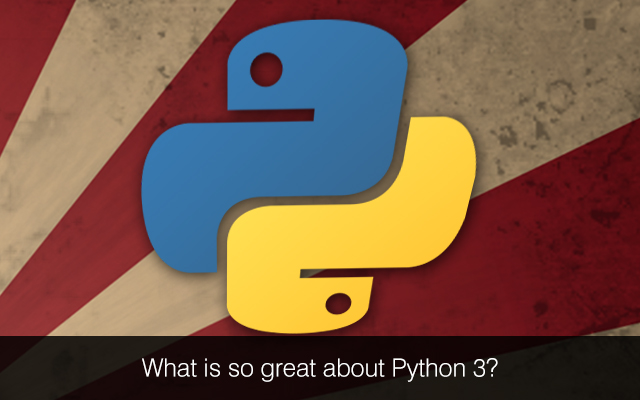What is so great about Python 3?
 As a dynamic programming language, Python is being used by developers across the world as a scripting as well as general-purpose language. The open source language further enables developers to express concepts without writing lengthy code, while facilitating code reusability. Python is also used by developers as easy-to-use scripting or automation interfaces required by applications written in other programming languages. A programmer can further avail several new modules by opting for Python 3.
As a dynamic programming language, Python is being used by developers across the world as a scripting as well as general-purpose language. The open source language further enables developers to express concepts without writing lengthy code, while facilitating code reusability. Python is also used by developers as easy-to-use scripting or automation interfaces required by applications written in other programming languages. A programmer can further avail several new modules by opting for Python 3.
New Models Added to Python 3 to Make It More Powerful
Concurrent.futures: The module provides a high-level interface that can be used by programmers to execute the callables in an asynchronous manner. However, the asynchronous execution of callable can be performed in a number of ways. The developer can use ThreadPoolExecutor to execute the callable through threads. Also, he can use the ProcessPoolExecutor to make the execution a separate process. But each method requires the same interface that is defined by the abstract Executor class.
Faulthandler: As the name indicates, the module includes the function required to explicitly dump Python tracebacks. The functions are executed when the application faces stops performing due to a fault, user signal or timeout. The faulthandler.enable() function is called to install fault handles for SIGFPE, SIGABRT, SIGILL, SIGBUS and SIGSEGV. The functions can be setup during the project startup either by using the X faulthandler command line option or by setting the PYTHONFAULTHANDLER environment variable:
Importlib: The importlib module can be used for two distinct purposes. Firstly, a programmer can implement the import statement within the Python source code. In addition to being portable to the Python interpreter, the module makes it easier for developers to comprehend the implementation. Secondly, the programmer can create custom objects that will participate in the process of importaing the components.
Ipaddress: The module enables developers to create, operate and manipulate on IPv4 and IPv6 addresses and networks. They can simply use the functions and classes included in this module to handle a variety of IP address related tasks including validating a network definition or IP address, and checking if multiple hosts are on a single subnet.
Unittest.mock: The module makes it easier for developers to test the Python application. The QA professionals can replace certain parts of the application with mock objects while testing the application, and make assertions about their usage. The core Mock class provided by the module helps programmers in not creating additional stubs throughout the testing suite. Along with being easy to use, the module is also designed with the features required for unit testing.
Selectors: The selectors module is designed based on select module primitives. It can be used by Python developers for high-level and efficient I/O multiplexing. Further, the programmers can exercise tight control over the OS-level primitives used. In addition to the BaseSelector abstract base class, the module also defines a set of concrete implementation for I/O multiplexing. However, the types of file object supported by the module with vary from one operating system to another.
Statistics: The module provides the functions required for calculating mathematical statistics of numeric data. These functions further support a wide range of numeric data types including int, float and decimal. However, currently the module does not support the behavior of several data types. The developers have to define mixed types specifically, and implement them according to the requirements of the project.
Recently, Python 3.4 was released with a set of new features to complement the latest trends in software development. The most recent version of the open source programming language comes with a new feature called asyncio that provides Asynchronous IO support. Further, Python 3.4 comes with a set of advanced features to meet the requirements of Cloud developers. You can get in touch with a custom Python Development company who can help you develop web apps that are stable, scalable and secure.
We provide Python development services. If you would like to discuss with python experts India progammer, please contact us Mindire Solutions.